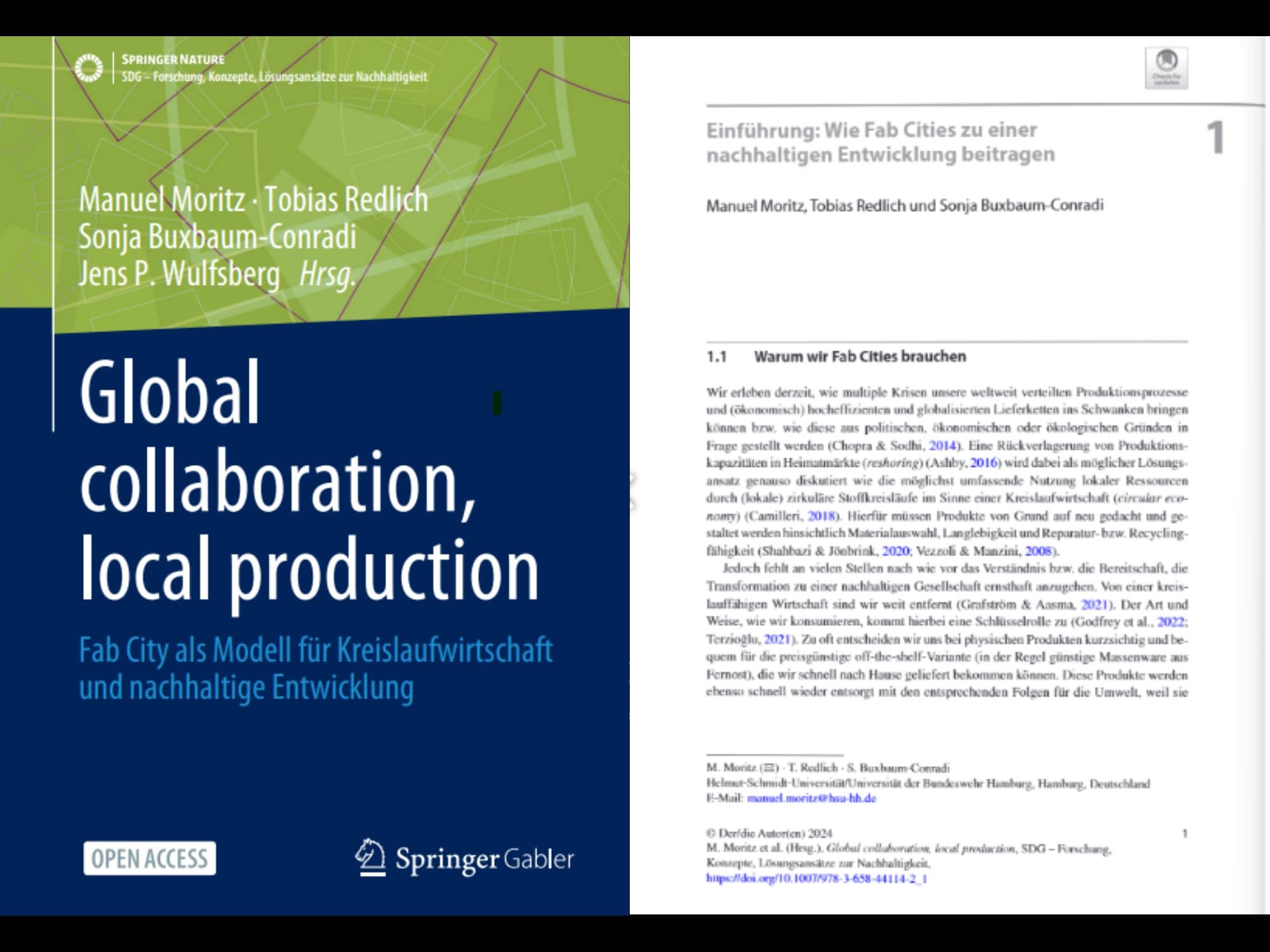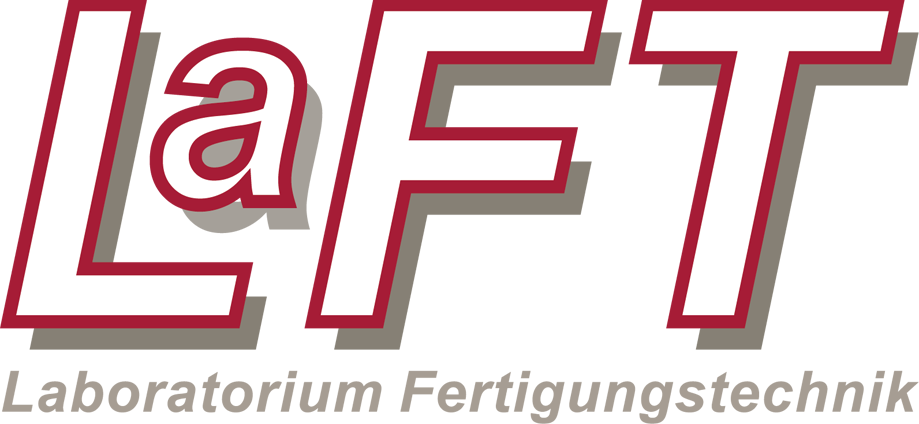| Peuckert et al. (2025) | Measuring the Impacts of Fab Labs: A Review of Quantitative Research and Evidence | |
| Buxbaum-Conradi et al. (2025) | Fab City Hamburg Playbook – Erkenntnisse aus dem transdisziplinären Projekt „Fab City: Dezentrale digitale Produktion für die urbane Wertschöpfung“ | |
| Kober et al. (2025) | Success criteria for value-oriented digital twin development and implementation: insights from an industry case study | |
| Omer et al. (2025) | Enabling Technology Diffusion with the Open Lab Starter Kit | |
| Redlich et al. (2025) | AI Meets Distributed Manufacturing: Wie KI die Verbreitung digitaler Fertigung fördert | |
| Redlich et al. (2025) | Entwicklung eines automatischen Open-Source-Werkzeugwechslers | |
| Moritz et al. (2024) | Global collaboration, local production – how Fab Cities enable a circular economy | |
| Moritz et al. (2024) | Einführung: Wie Fab Cities zu einer nachhaltigen Entwicklung beitragen | |
| Moritz et al. (2024) | Global collaboration, local production: Fab City als Modell für Kreislaufwirtschaft und nachhaltige Entwicklung | |
| Saubke et al. (2024) | Open Hardware – Evaluation Criteria Concerning the Quality and Sufficiency of Technical Documentation | |
| Saubke et al. (2024) | Co-Creating Open Hardware – Technological Feasibility Of Measures For A Distributed And Agile Planning Preparation | |
| Saubke et al. (2024) | A Survey of Open Source Hardware Developers – Perspectives on Digital Platform-Based Product Development | |
| Saubke et al. (2024) | Customer-oriented sustainability criteria for value chains in local production networks of SMEs | |
| Mariscal-Melgar et al. (2024) | Exploring Open-Source Software Ecosystems for Hardware Development | |
| Mariscal-Melgar et al. (2024) | Sustainable Computing Through Open Standard ISAs: Leveraging Tailor-Fit Hardware Designs for Circular Economies | |
| Di Martino et al. (2024) | Case Study OLSK Small Laser/OLSK Small Laser case study – Designing and prototyping open-source digital fabrication machines | |
| Boeing, Niels | The Fab City Index: A Toolkit for Measuring Progress Towards a Circular Economy | |
| Kühr et al. (2024) | Circular und Distributed Design im Kontext der Fab City | |
| Mariscal-Melgar et al. (2024) | Commercialization of Open Source Hardware: Turning Open Designs into Profit | |
| Kober et al. (2024) | Digital Twin Stakeholder Communication: Characteristics, Challenges, and Best Practices | |
| Kober (2024) | Zielorientierte und nutzenzentrierte Entwicklung und Implementierung von Digital Twins in Fertigungsunternehmen | |
| Kober et al. (2024) | Digital Twins: A Critical Perspective and Research Trends | |
| Buxbaum-Conradi et al. (2024) | What kind of city is the Fab City? Some theoretical groundings and intellectual predecessors of the Fab City Project | |
| Wildhack et al. (2024) | Transitioning to a fab city: a governance perspective how transition management can promote urban change – case study hamburg | |
| Lange et al. (2024) | On the usability of open-source machine tools | |
| Omer et al. (2023) | Exploring the Potential of Open Source Machine Tools for Sustainable Industrial Development in Low Resource Contexts – A Case Study of Migrant-Run Microenterprises in Oman | |
| Peuckert & Kern (2023) | How user innovation communities contribute to sustainability transitions. An exploration of three online communities | |
| Saubke et al. (2023) | Product Development through Co-Creation Communities – General Measures For A Distributed And Agile Planning Preparation in Cross-Company Production | |
| Mariscal-Melgar et al. (2023) | Semi-Automatic Generation of Assembly Instructions for Open Source Hardware | |
| Mariscal-Melgar & Hijma (2023) | OSH Automated Documentation – Creating an Assembly Manual for a Vise Video | |
| Mariscal-Melgar & Hijma (2023) | OSH Automated Documentation – Overview Video | |
| Mariscal-Melgar & Hijma (2023) | Common Lisp Scribble Subset Parser | |
| Mariscal-Melgar & Hijma (2023) | FreeCAD for OSH Automated Documentation | |
| Mariscal-Melgar & Hijma (2023) | FreeCAD OSH Automated Documentation Arch Linux Package | |
| Mariscal-Melgar & Hijma (2023) | FreeCAD OSH Automated Documentation Workbench | |
| Mariscal-Melgar & Hijma (2023) | Live Image for OSH Automated Documentation | |
| Mariscal-Melgar & Hijma (2023) | OSH Automated Documentation Base | |
| Mariscal-Melgar & Hijma (2023) | OSH Automated Documentation Data | |
| Mariscal-Melgar & Hijma (2023) | OSH Automated Documentation PDF | |
| Mariscal-Melgar & Hijma (2023) | OSH Automated Documentation Apptainer | |
| Omer & Mariscal-Melgar (2023) | CNC Gas Cutter G-Code Generation Toolkit | |
| Hildebrandt & Wulfsberg (2023) | Open PPS – Konzeption eines Modells zur Produktionsplanung und -steuerung für dezentrale, vernetzte und offene Produktionswerkstätten | |
| Lange et al. (2023) | Sozio-technische einflussfaktoren auf die bedienbarkeit von werkzeugmaschinen: Eine explorative studie zur erhebung zentraler einflussbereiche der bedienbarkeit aus anwender-, ausbilder- und entwicklerperspektive | |
| Omer et al. (2023) | Pushing the frontiers of personal manufacturing with open source machine tools | |
| Omer et al. (2023) | Exploring the potential of open source machine tools for sustainable industrial development in low resource contexts – a case study of migrant-run microenterprises in oman | |
| Schlömer et al. (2023) | Die erkundung von phänomenen und schlüsselstellen des transfers von berufsbildung für eine nachhaltige entwicklung (BBNE) – eine transfermodellierung | |
| Simon et al. (2023) | Enhancing SLM Stainless Steel: Model-Based Parameter Optimization | |
| Kober et al. (2023) | A Method for Calculating Optimum Digital Twin Fidelity | |
| Kober et al. (2023) | Relations of Digital Twin Fidelity and Benefits: A Design-to-Value Approach | |
| Markert et al. (2023) | Enhancing Operations Planning and Scheduling in Dynamic Production Systems by Using CLIP | |
| Krenz et al. (2023) | Identification of Action Areas for the Promotion of Local Manufacturing in Reference to System Theory | |
| Moritz et al. (2022) | Who are your Design Heroes?: Finding and Understanding Lead Solvers in Innovation-Contest Communities | |
| Omer et al. (2022) | Democratising Fab Labs with Open Source Machine Tools | |
| Ingrassia et al. (2022) | The journey of Fabulaser Mini: designing, making and documenting of an open source, Fablab produced, laser cutter | |
| Hildebrandt et al. (2022) | Labor für intelligente Leichtbauproduktion in der Metropolregion Hamburg | |
| Hildebrandt et al. (2022) | Wissenstransfer für die intelligente Fabrik | |
| Hildebrandt et al. (2022) | Open Source Hardware and Decentralized Urban Production for Urgently Needed Products during the COVID-19 Pandemic | |
| Hildebrandt et al. (2022) | What are the Role and Capabilities of Fab Labs as a Contribution to a Resilient City? Insights from the Fab City Hamburg | |
| Mariscal-Melgar et al. (2022) | Distributed Manufacturing: A High-Level Node-Based Concept for Open Source Hardware Production | |
| Buxbaum-Conradi et al. (2022) | Fab City Hamburg: A living lab approach to explore new forms of open, distributed manufacturing in an urban context | |
| Lange et al. (2022) | Community-based replication of open source machine tools | |
| Omer et al. (2022) | Democratizing manufacturing – conceptualizing the potential of open source machine tools as drivers of sustainable industrial development in resource constrained contexts | |
| Pacuku et al. (2022) | Idea evaluation by citizens : the hamburg fab city maker challenge case | |
| Schulz et al. (2022) | dtec.bw-Beiträge der helmut-schmidt-universität / universität der bundeswehr hamburg: Forschungsaktivitäten im zentrum für digitalisierungs- und technologieforschung der bundeswehr dtec.bw | |
| Stieler (2022) | Fab city hamburg – kreislauf auf hanseatisch | |
| Kühr & Günter (2022) | How FCOS fosters Circular Design | |
| Kober et al. (2022) | Digital Twin Fidelity Requirements Model for Manufacturing | |
| Kober et al. (2022) | Challenges of Digital Twin Application in Manufacturing | |
| Markert et al. (2022) | Cross-Company Routing Planning: Determining Value Chains in a Dynamic Production Network Through a Decentralized Approach | |
| Krenz et al. (2022) | Production Next Door – A business model for local, sustainable production | |
| Krenz et al. (2022) | The Phenomenon of Local Manufacturing: An Attempt at a Differentiation of Distributed, Re-distributed and Urban Manufacturing | |
| Krenz et al. (2021) | Towards Smaller Value Creation Cycles: Key Factors and their Interdependencies for Local Manufacturing | |
| Hildebrandt et al. (2021) | Production Planning And Control In Distributed And Networked Open Production Sites – An Integrative Literature Review | |
| Seidel et al. (2021) | Fab City OS – Giving designers the infrastructure needed to flip the power relations of our current productive model. This is Distributed Design – Making a local & global design paradigm. | |
| Hildebrandt et al. (2020) | Urbane Mikrofabriken für die hybride Produktion | |
| Hildebrandt et al. (2020) | Persönliche Schutzausrüstung aus der hybriden urbanen Mikrofabrik | |
| Moritz & Redlich (2019) | How to Co-create Value with Users: A Case Study on Local Motors’ Contest Community | |
| Moritz et al. (2019) | On the Economic Value of Open Source Hardware – Case Study of an Open Source Magnetic Resonance Imaging Scanner | |
| Redlich et al. (2019) | Co-Creation: Reshaping Business and Society in the Era of Bottom-up Economics | |
| Redlich et al. (2019) | Introduction: Co-creation in the Era of Bottom-Up Economics | |
| Moritz et al. (2019) | Best Practices and Pitfalls in Open Source Hardware | |
| Moritz et al. (2019) | Kollaboration und Wettbewerb bei Ideenwettbewerben – eine Userperspektive | |
| Redlich et al. (2019) | Unsicherheiten der Technikentwicklung als gesellschaftliches und politisches Handlungsfeld | |
| Redlich & Moritz (2018) | Die Zukunft der Wertschöpfung – dezentral, vernetzt und kollaborativ | |
| Redlich et al. (2018) | Interdisziplinäre Perspektiven zur Zukunft der Wertschöpfung | |
| Buxbaum-Conradi et al. (2018) | Lokale Einbettung und globale Kollaborationsprozesse offener Produktionswerkstätten: Ein Einblick in die deutsche und arabische Maker-Community | |
| Redlich et al. (2017) | Digitale Produktion: Bottom-up-Ökonomie | |
| Fette et al. (2017) | New Methods for Computing and Developing Hybrid Sheet Molding Compound Structures for Aviation Industry | |
| Moritz et al. (2016) | Value creation in open-source hardware communities: Case study of Open Source Ecology | |
| Moritz et al. (2016) | Collaborative Competition or Competitive Collaboration? Exploring the User Behavior Paradox in Community-based Innovation Contests | |
| Redlich et al. (2016) | OpenLabs — Open Source Microfactories Enhancing the FabLab Idea | |
| Redlich & Moritz (2016) | Bottom-up Economics. Foundations of a Theory of Distributed and Open Value Creation | |
| Buxbaum-Conradi et al. (2016) | Local Embedding and Global Collaboration of Open Innovation, Production and Maker Spaces – The (uncovered) potential of knowledge transfer and collaboration at the grassroots level | |
| Buxbaum-Conradi et al. (2016) | Conceptualizing Hybrid Human-Machine Systems and Interaction | |
| Moritz et al. (2015) | Tesla Motors, Inc.: Pioneer towards a new strategic approach in the automobile industry along the open source movement? | |
| Redlich et al. (2015) | Why traditional (manufacturing) industry will suffer the fate of print media | |
| Redlich et al. (2015) | Survival through Openness – How Traditional Industry could avoid the Fate of Print Media | |
| Redlich et al. (2015) | OpenLabs – Collaborative Industrialization with Distributed and Open Source Microfactories | |
| Redlich et al. (2015) | The Strategy of Openness in industrial production | |
| Buxbaum-Conradi et al. (2015) | Sozial nachhaltige Entwicklung technischer Unterstützungssysteme | |
| Buxbaum-Conradi et al. (2015) | Modularization and the Dynamics of Inter-organizational Collaboration: Producing and Bridging Spatial and Organizational Distances | |
| Redlich et al. (2014) | Openness and Trust in Value Co-Creation: Potentials for Inter-organizational Knowledge Transfer and New Business Models | |
| Redlich et al. (2014) | The Impact of Openness on Value Co-Creation in Production Networks | |
| Redlich & Wulfsberg (2011) | Open Production – Framework for Co-creative Product Realization | |
| Redlich (2011) | Wertschöpfung in der Bottom-up-Ökonomie | |
| Redlich (2010) | Open Production – a Scientific Framework for Co-creative Product Realization | |
| Redlich & Wulfsberg (2010) | Open Production Gestaltungsmodell für die Wertschöpfung in der Bottom-up-Ökonomie | |
| Redlich et al. (2010) | Wissenschaftliche Fundierung der Wertschöpfungsgestaltung in der Bottom-up-Ökonomie | |
| Redlich et al. (2009) | Neue Kooperationsmuster in Entwicklung und Produktion: Open Production | |
| Redlich et al. (2008) | Virtual Factory for Customized Open Production | |
| Redlich & Bruhns (2008) | Open Production: A New Broker-Based Approach to Interactive Value Creation and User Manufacturing | |
| Redlich et al. (2008) | Square Foot Manufacturing: Event-Driven Manufacturing by Means of Multifunctional Work Spaces | |




